
General Haggai Mordechai, former commander of the IDF in Judea and Samaria, says the security situation in the region remains "fragile", even though he does not believe there will be a third intifada.
"We are keeping our finger on the pulse," Mordechai said in an interview with AFP, as he stepped down from his post.
"Despite the relative calm, the army is ready for any scenario. A deterioration is possible from one day to the next," he warned in the interview, which was released Thursday and made just days before the stabbing attack in the Tapuach Junction on Tuesday, in which Evyatar Borovosky was murdered.
Mordechai, who stepped down on April 1 to take over as head of the military's ground staff, said he believes the calm is partly due to "a larger military presence on the ground", although he does not give numbers.
To further back up his claim, the general, who has spent most of his military career in Judea and Samaria, pointed to statistics showing that there have been only 24 shooting attacks targeting Israeli soldiers and civilians in the past two years.
That is down from 3,308 in 2001 at the height of the Second Intifada, also known as the Oslo War.
One reason for this, Mordechai told AFP, is the army's attempts "to ease the situation for the population, by giving them more work permits in the settlements, greater freedom of movement, by avoiding collective punishment and letting them hold demonstrations."
"Our policy is restraint because this is not a battlefield," he said, although he admitted that not everything always goes to plan.
"Mistakes can happen, the situation for the soldiers is very complex," he acknowledged.
Mordechai also said that the IDF’s security coordination with the Palestinian Authority was working well.
"It is in their interest. But their motivation decreases when there is talk about reconciliation with Hamas," he said.
"Security cooperation with the Palestinian Authority works because it is in their interest not to let Hamas take control [of Judea and Samaria]," he added.
"So long as we are on the ground, Hamas will not take power, but it is necessary to prevent its reconciliation with Fatah, which would be a victory for the Islamist movement."
Hamas, said Mordechai, had been strengthened by the prisoner swap deal of October 2011, when more than 1,000 terrorists were freed from Israeli jails in exchange for the release of soldier Gilad Shalit, who was held captive in Gaza for more than five years.
It also benefited from the eight-day conflict with Israel last November, when Gaza-based terrorists fired rockets at Jerusalem and Tel Aviv, he added.
"Hamas is getting stronger. The Shalit deal proved to the Palestinian street that terror pays off and (Israel's) Operation Pillar of Defense was perceived as a victory because of the success in firing at Tel Aviv and Jerusalem," he explained.
Another area of concern was the rise in incidences of throwing stones or firebombs, "which we consider to be acts of terror," said Mordechai.
Figures compiled by the IDF show that in 2012, there were more than 4,300 cases of rock throwing, 423 firebomb attacks and 25 attempts to use explosive devices against civilian or military targets in Judea and Samaria, noted AFP.
Mordechai also criticized the Palestinian Authority for its "policy of delegitimizing Israel by encouraging the establishment of illegal outposts in E1, and by supporting demonstrations."
E1 is a strip of land connecting Jerusalem and Maaleh Adumim, where Israel approved construction in after the Palestinian Authority was recognized by the United Nations as a non-member observer state, in a unilateral move by PA Chairman Mahmoud Abbas which violates the Oslo Accords. PA Arabs have countered the Israeli approval of construction by setting up illegal outposts in the area. This has occurred at least four times in the past few months.
The army, emphasized Mordechai, was "ready for any scenario, including the worst.”1
"I cannot ensure that stability will remain for the long term even if I don't believe that a third intifada will break out," he told AFP.
In light of the threats currently facing Israel along its border with Egypt, Gaza and Syria, Judea and Samaria are "the calmest of all the fronts," he said.
"When you remember what happened during the second intifada, the buses which blew up across the country but also the consequences for the Palestinian population, you understand that no one wants to go back to that sad period," he said.
